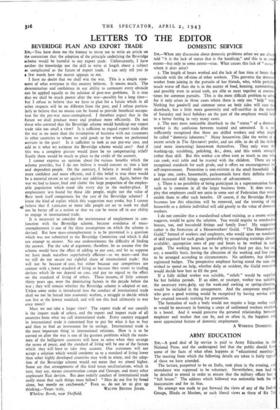BEVERIDGE PLAN AND EXPORT TRADE
LETTERS TO THE EDITOR
Sm,—You have done me the honour to invite me to write an article on the contention that the adoption of the principle underlying the Beveridge scheme would be harmful to our export trade. Unfortunately, I have neither the knowledge nor the skill to write at length about a subject so complicated as the future of export trade. I can only tell you in a few words how the matter appears to me.
I have no doubt that we shall win the war. This is a simple state- ment of what everyone in this country believes. It means much. The determination and confidence in our ability to surmount every obstacle can be applied equally to the solution of post-war problems. It is true that we shall be much poorer after the war—possibly for a long time— but I refuse to believe that we have to plan for a future which in all other respects will be no different from the past, and I refuse particu- larly to believe that no means can be found to provide beneficial occupa- tion for the pre-war mass-unemployed. I therefore expect that in the future we shall produce more and produce more efficiently. Do not those who contend that the Beveridge scheme would handicap our export trade take too small a view? Is it sufficient to regard export trade after the war as no more than the resumption of business with our customers in other countries to whom we sold goods or for whom we performed services in the past? Is it sufficient to look at our pre-war cost, and add to it what we estimate the Beveridge scheme would cost? And if this was a complete picture would there be no compensating relief? Surely there would be much to place to the credit of the account.
I cannot express an opinion about the various benefits which the scheme provides, but I do not believe it would convert us into a lazy and dependent people. On the contrary, I believe it would make us more confident and more efficient, and if this belief is true there would be a material return to set against any addition to cost. Again, before the war we had to house, feed and clothe the large proportion of the employ- able population which stood idle every day in the market-place. If employment was found for those idle people, might not the value of their work itself compensate for the cost of the Beveridge scheme? I know the kind of replies which.this suggestion may evoke, but I cannot
at believe that if i,000,000 or more idle people are set to work we shall not be better off as a nation or that we can be worse off in our ability to engage in international trade.
It is necessary to consider the maintenance of employment in con- junction with the Beveridge scheme, because avoidance of mass- unemployment is one of the three assumptions on which the scheme is devised. But how mass-unemployment is to be prevented is a question which was not submitted to the Beveridge Committee and which it did not attempt to answer. No one underestimates the difficulty of finding the answer. For the sake of argument, therefore, let us assume that the scheme would have the effect of adding to our cost, and let us suppose we have made ourselves superlatively efficient—as we must—and that we still do not secure our rightful share of international trade: this will not be because of cost, but either because our competitors are content with a lower standard of living or because they resort to trading devices which do not depend on cost, and pay no regard to the effect on the standard of living of others. These reasons, of little account thirty years ago, were the dominating factors in the decade before the war ; they will remain whether the Beveridge scheme is adopted or not. Unless some order is introduced into the conduct of international trade shall we not be forced into economic warfare, a struggle to decide which can live at the lowest standard, and will not this lead ultimately to war once more?
Must we not take a larger view? The export trade of our countiy Is the import trade of others, and the export and import trade of all countries form what we call international trade. Every country engaged in international trade is concerned first to pay for what it has to buy and then to find an investment for its savings. International trade is the most important thing in international relations. How it is to be carried on after the war is one of the greatest problems which the states- men of the belligerent countries will have to solve when they arrange the terms of peace, and the standard of living will be one of the factors which they will have to take into account. Our statesmen will not accept a solution which would condemn us to a standard of living lower than other highly developed countries may wish to enjoy, and the adop- tion of the Beveridge scheme would not mean that we aimed higher. Some say that arrangements of this kind mean totalitarianism, which in turn, they say, means concentration camps and Gestapo, and many other unpleasant Nazi devices. But does orderly conduct of international trade really mean that such things must follow? " Men do not live by bread alone, but mostly on catchwords." Even so, do not let us give up


























 Previous page
Previous page